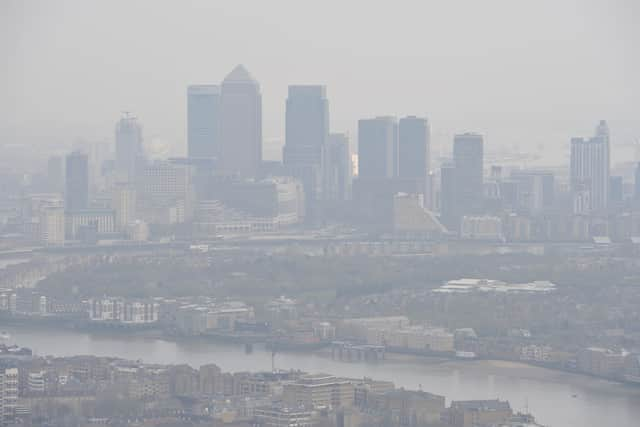Calls for ‘urgent’ action to cut air pollution as exposure linked to increased dementia risk
and live on Freeview channel 276
Exposure to air pollution “might be a risk factor for dementia” even at levels below UK, US and EU air quality standards, researchers have warned.
Exposure to fine particulate matter (PM2.5) has been linked to an increased risk in a new study published in The BMJ, prompting calls for urgent government action to cut exposure to pollution globally - as current interventions to delay or prevent the onset of dementia are scarce.
Advertisement
Hide AdAdvertisement
Hide AdAnalysis by researchers at the Harvard TH Chan School of Public Health suggests that for every two micrograms per cubic metre increase in average annual PM2.5 concentration (fine particulate matter), the overall risk of dementia rises by 4%.
Fine particulate matter is an air pollutant made up of tiny pieces of solid or liquid substances, which are inhaled by people as they breathe.
More than 57 million people worldwide are living with dementia and the number is continuing to increase.
Researchers in the US specifically looked at 14 studies examining the link between dementia and exposure to PM2.5. More limited data suggests that exposure to nitrogen dioxide and nitrogen oxide gases, produced by burning fossil fuels, may also be a risk factor for dementia.
Advertisement
Hide AdAdvertisement
Hide AdThe research did not find a link between dementia and ozone - gas formed in the air due to reactions between pollutants.


‘For many people, the risk is inescapable’
The researchers said that while caution is needed when interpreting the findings, the results “strengthen the evidence that air pollutants are risk factors for dementia”.
Similarly, in a linked editorial, experts from University College London also warned that air pollution had the “potential to substantially affect dementia risk”.
They said: “Current estimates suggest that PM2.5 concentrations in major cities vary considerably from below 10 micrograms per cubic metre in some cities (eg Toronto, Canada) to more than 100 micrograms per cubic metre in others (eg Delhi, India), therefore, air pollution has the potential to substantially affect dementia risk globally.”
Advertisement
Hide AdAdvertisement
Hide AdThey highlight that air pollution is also linked to an increased risk of other health conditions, with an estimated 6.5 million deaths attributable to air pollution each year.
They added: “Although individuals can take steps to reduce their own personal exposure, for example, by remaining indoors on high air pollution days, this solution is impractical in the long term, so for many people, the risk is inescapable. [The] findings therefore add urgency to the need for effective policy measures to reduce air pollution globally.”
Dr Susan Mitchell, head of policy at Alzheimer’s Research UK, a charity not involved in the study, said: “Poor air quality is a significant public health issue, and this new review helps to cement the relationship between certain types of air pollution and dementia risk. But as individuals there’s little we can do about the air we breathe.
“So it’s vital the government leads from the front in reducing air pollution and the resulting harm to our brain health.”
Advertisement
Hide AdAdvertisement
Hide AdShe added that in December the government “missed a clear opportunity for decisive action on air pollution by setting an unambitious and inadequate target of 10 micrograms a cubic metre by 2040” which was “far less stringent than what Alzheimer’s Research UK and the World Health Organization recommended.”
She said the government now needs to ensure “brain health is central to its major conditions strategy and its wider ambitions for prevention”.
Comment Guidelines
National World encourages reader discussion on our stories. User feedback, insights and back-and-forth exchanges add a rich layer of context to reporting. Please review our Community Guidelines before commenting.
